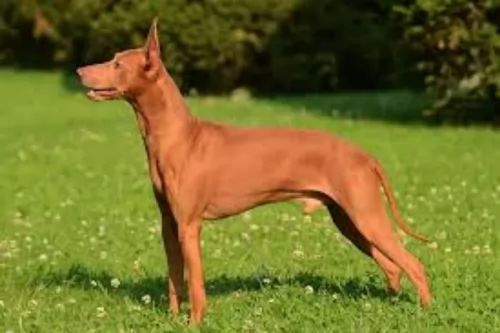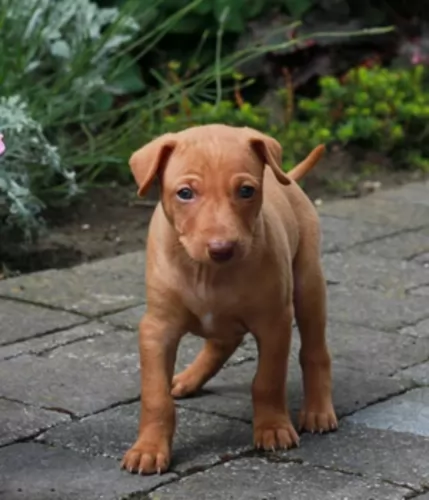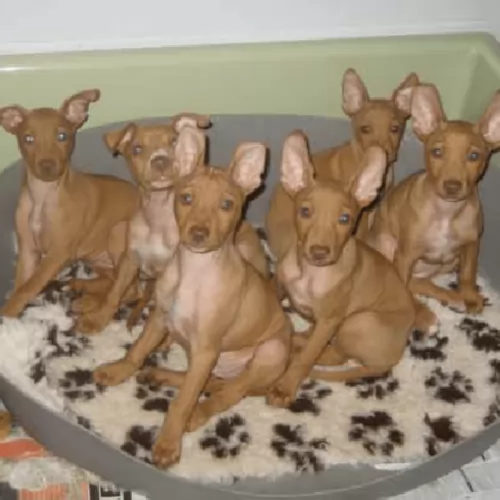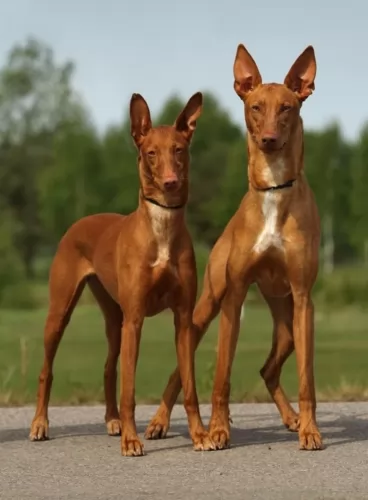 Petzlover
Petzlover Cirneco dell'Etna is originated from Italy but Dogue De Bordeaux is originated from France. Cirneco dell'Etna may grow 15 cm / 5 inches shorter than Dogue De Bordeaux. Cirneco dell'Etna may weigh 53 kg / 116 pounds lesser than Dogue De Bordeaux. Both Cirneco dell'Etna and Dogue De Bordeaux has almost same life span. Both Cirneco dell'Etna and Dogue De Bordeaux has almost same litter size. Cirneco dell'Etna requires Moderate Maintenance. But Dogue De Bordeaux requires Low Maintenance
Cirneco dell'Etna is originated from Italy but Dogue De Bordeaux is originated from France. Cirneco dell'Etna may grow 15 cm / 5 inches shorter than Dogue De Bordeaux. Cirneco dell'Etna may weigh 53 kg / 116 pounds lesser than Dogue De Bordeaux. Both Cirneco dell'Etna and Dogue De Bordeaux has almost same life span. Both Cirneco dell'Etna and Dogue De Bordeaux has almost same litter size. Cirneco dell'Etna requires Moderate Maintenance. But Dogue De Bordeaux requires Low Maintenance
 The Cirneco dell’Etna comes from the island of Sicily and not mainland Italy, although it is considered an Italian dog. It is a small dog that hunted rabbits and its calling card was its ability to go for hours without water or food. They have terrific endurance and a good sense of smell. They were developed for the harsh terrain they worked around places like Mount Etna. Of all the Mediterranean island hunting dogs, the Cirneco de’Etna is the smallest.
The Cirneco dell’Etna comes from the island of Sicily and not mainland Italy, although it is considered an Italian dog. It is a small dog that hunted rabbits and its calling card was its ability to go for hours without water or food. They have terrific endurance and a good sense of smell. They were developed for the harsh terrain they worked around places like Mount Etna. Of all the Mediterranean island hunting dogs, the Cirneco de’Etna is the smallest.
This is a very ancient breed, surviving on its hunting skills alone for thousands of years on Sicily. They then became guard dogs for the peasants. Because they had such speed, sense of smell, alertness and sight, they were great hunters.
Today’s Cirneco de’Etna is highly competitive in confirmation and make terrific pets. They are exceedingly friendly, energetic and low maintenance. Lure coursing is what they really excel at. They are good at agility and pursuit games as well.
 The Dogue de Bordeaux is an ancient French dog breed and his history goes so far back that it is difficult to have accurate records of his origin.
The Dogue de Bordeaux is an ancient French dog breed and his history goes so far back that it is difficult to have accurate records of his origin.
During the 1700s he was used as a guard dog, with theories suggesting that several Mastiff type breeds were the closest ancestors.
For centuries the Bordeaux Mastiff, also referred to as the Bordeaux Bulldog, came in two size varieties, with the larger version being the Dogue de Bordeaux. It is this large dog which made its appearance in the Hollywood movie ‘Turner & Hooch’, shooting him into more recognition and interest.
 The Cirneco de’Etna is a sleek, muscular sighthound. His ears are close together and high on his head. The head is lean, and the skull is almost flat in profile. The muzzle is about the same length as the skull and the nose is large and its coloring matches the dog’s coat. They have hard pads the same color as their nails, but they are never black.
The Cirneco de’Etna is a sleek, muscular sighthound. His ears are close together and high on his head. The head is lean, and the skull is almost flat in profile. The muzzle is about the same length as the skull and the nose is large and its coloring matches the dog’s coat. They have hard pads the same color as their nails, but they are never black.
 The Dogue de Bordeaux is a large molosser type dog with a large head, standing at 60 – 67cm and weighing anything between 54 and 65kg. His weight comes more from his muscular, powerful build rather than his height.
The Dogue de Bordeaux is a large molosser type dog with a large head, standing at 60 – 67cm and weighing anything between 54 and 65kg. His weight comes more from his muscular, powerful build rather than his height.
He is a powerful looking dog and his short coat is loose-fitting and is an attractive rich reddish brown color. There are wrinkles around the face with the nose being somewhat pinkish-orange as opposed to black.
The eyes are wide apart and are hazel. He has short to medium length floppy ears and where once the thick tail was docked, giving him a powerful, distinctive look, it is mostly left long today.
He is a confident, self-assured, territorial dog who will require training and socialization if he is to know his place in the home. He is a powerful mastiff-type dog, who without training can be stubborn, arrogant and somewhat aggressive towards strangers.
His looks and his territorial nature make him an excellent watchdog. He is no push-over and isn’t a good choice for the first time dog owner.
Without a strong, firm owner, he could prove difficult to handle. He is calm and laid back with children in the home and he can get along well with other pets if he has been brought up with them since puppy-hood.
 The Dogue de Bordeaux isn’t a big, boisterous kind of dog but is rather calm and relaxed. As a watchdog however, he can surprise you and become quite active, showing agility for such a hulk.
The Dogue de Bordeaux isn’t a big, boisterous kind of dog but is rather calm and relaxed. As a watchdog however, he can surprise you and become quite active, showing agility for such a hulk.
He can adapt to life in the city or the country but even though he appears lazy, he will need moderate daily exercise.
He loves his human family and wants to be constantly with them. He is stubborn but will do well with training and socialization.
Calm and easy-going and with his easy-to-maintain short, soft coat, be prepared for some drooling and snoring from this loving, devoted large pet of yours.
 Like many dogs that come from ancient breeds with little cross breeding over the years, there are not a lot of inherited issues for the Cirneco de’Etna. Also, there are so few dogs remaining that little is known about their health in general and there are no studies to go on. Some breeders will do test despite the fact that none are recommended.
Like many dogs that come from ancient breeds with little cross breeding over the years, there are not a lot of inherited issues for the Cirneco de’Etna. Also, there are so few dogs remaining that little is known about their health in general and there are no studies to go on. Some breeders will do test despite the fact that none are recommended.
Their most common health issues are acquired such as injuries from running or competitions and obesity. Both can be controlled by the owner.
 The Dogue De Bordeaux doesn’t have as long a lifespan as many other dogs, but with good care, can go to 7 – 10 years of age.
The Dogue De Bordeaux doesn’t have as long a lifespan as many other dogs, but with good care, can go to 7 – 10 years of age.
Because he is a brachycephalic breed – a short-nosed dog such as the Boxer, Pug and Bulldog – he may well have the same number of teeth as other dogs, but the teeth are crowded, putting dogs like this at higher risk of getting dental disease.
His teeth will need to be brushed 2 or 3 times a week to prevent plaque and tartar getting trapped.
Brachycephalic Syndrome is also something to watch out for with your Dogue de Bordeaux. It’s an upper respiratory disorder which can bring on difficulty with breathing because of the crowding of tissue and narrower airways.
 The Cirneco needs a good quality food since they are such high energy dogs. Be careful not to overfeed them so that they become obese.
The Cirneco needs a good quality food since they are such high energy dogs. Be careful not to overfeed them so that they become obese.
As previously mentioned, the main concern for owners is injuries acquired while on a running course or in the activities of daily living. They have been known to hurt their feet. They need their ears checked regularly for any signs of infection or irritation. Clean out any excess water or dirt.
This is an intelligent, hardy breed that needs mental and physical stimulation. They need a job, or they can be a major problem. They love hunting of course but also excel at agility, lure crossing, and competition. He is loyal and loves being with people. Take him for long walks but don’t let him off the leash.
 He isn’t the most active dog and he is inclined to snooze quite a bit throughout the day. It will nonetheless be a good idea to include him in your daily walks and allow him to take part in a ball game now and again.
He isn’t the most active dog and he is inclined to snooze quite a bit throughout the day. It will nonetheless be a good idea to include him in your daily walks and allow him to take part in a ball game now and again.
The Dogue de Bordeaux needs to be fed a high-quality dog food in keeping with his large size and age.
This dog is known for drooling, and because of his wrinkled face, you’ll need to be watching the facial area that it is kept clean and dry to avoid skin infections. Check his ears at the same time to ensure they are free from dirt and wax.
The short coat does shed throughout the year, and you will need to be brushing him down twice a week to remove all those loose hairs.